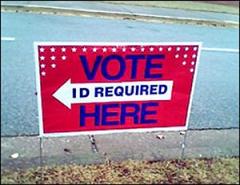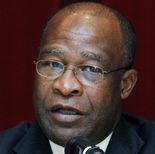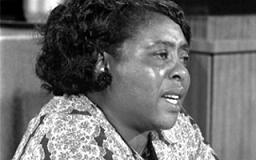
From Media Reports
JACKSON – Mississippi voters could have to start showing photo identification at the polls by the June 2014 federal primaries, Secretary of State Delbert Hosemann said last week after the U.S. Supreme Court ruled that certain state and local governments no longer need federal approval to change their own election laws or procedures.
 The Voting Rights Act of 1965 has required Mississippi and other areas with a history of racial discrimination, mainly in the South, to get clearance for changes as large as implementing a voter ID law to as small as relocating a precinct.
The Voting Rights Act of 1965 has required Mississippi and other areas with a history of racial discrimination, mainly in the South, to get clearance for changes as large as implementing a voter ID law to as small as relocating a precinct.
In a 5-4 ruling, justices blocked enforcement of a provision in the 1965 Voting Rights Act that requires Mississippi and several other state and local governments to get federal approval before making any changes to voting laws or procedures. Preclearance has been required in areas with a history of racial discrimination, mainly in the South.
Justices said the Voting Rights Act does not reflect racial progress made in the United States over the past 48 years. They said the preclearance portion can't be enforced unless Congress comes up with a new formula to determine which state or local governments should be covered, based on what Chief Justice John Roberts called “current conditions'' in the United States.
Many Republican officials in Mississippi, including Hosemann, applauded the ruling and said people in the state have embraced nondiscriminatory voting procedures.
“We're not the same old Mississippi that our fathers' fathers were,'' said Hosemann, the state's top elections official, said during a news conference at the state Capitol.
However, Democratic U.S. Rep. Bennie Thompson, the only black member of Mississippi's congressional delegation, said the ruling “guts the most critical portion of the most important civil rights legislation of our time.''
“[This] Supreme Court decision will make it harder for many Americans to exercise their Constitutionally-guaranteed right to vote,'' Thompson said in a news release.
“This decision has the potential to set voting rights back more than fifty years,” stated NAACP Chairman Roslyn M. Brock. “It is especially unsettling in a year when we commemorate Medgar Evers, a man who gave his life to expand and protect the right to vote. But in the spirit of Medgar, who said 'You can kill a man but you can't kill an idea,' we will stand our ground and bring this debate to Congress.”
“This decision is outrageous. The Court’s majority put politics over decades of precedent and the rights of voters,” stated NAACP President and CEO Benjamin Todd Jealous. “Congress must resurrect its bipartisan efforts from 2006 to ensure that the federal government has the power to preemptively strike racially discriminatory voting laws. Without that power, we are more vulnerable to the flood of attacks we have seen in recent years. While Section 2 is powerful after the fact, we must have a tool to protect against stolen elections proactively.”
Mississippians in November 2011 approved a state constitutional amendment that would require all voters to show ID before casting a ballot. In 2012, the Republican-controlled Legislature passed a bill to put the voter ID requirement into law. The constitutional amendment and the proposed law have both been awaiting Justice Department clearance for several months.
Critics compare voter ID to poll taxes that were used decades ago to keep black people from voting.
The Supreme Court ruling clears the way for Hosemann to start implementing the voter ID law. Hosemann said he'll take several steps to ensure people who don't have a photo ID can get a free one:
The state will purchase cameras for each circuit clerk's office, so anyone who needs an ID can get a picture taken.
Mississippi is establishing agreements with other states to allow a free check of electronic vital statistics records, in case a person needs to verify his or her own birth certificate information before getting a photo ID. Hosemann said Mississippi already has agreements with at least 45 other states, and the goal is to get agreements with all of them.
Officials will establish procedures to provide free transportation to a circuit clerk's office for anyone who needs to get a state-issued photo ID.
Longtime state Rep. Ed Blackmon, of Canton, a Democrat and member of the Legislative Black Caucus, said in a phone interview that Mississippi should “absolutely'' still be required to get federal approval for changes in voting laws.
“The fact is, Mississippi is still very much a racially polarized state, particularly with regards to its politics,'' said Blackmon, an attorney who has worked on voting rights issues for about 40 years.
If Mississippi and a few other states have to get federal clearance for election changes, all states should have to do so, said state House Elections Committee Chairman Bill Denny, R-Jackson.
“I've always felt that it was unconstitutional,'' Denny said in a phone interview.. “I would've agreed in 1965 that something had to be done, but it should've been done to all 50 states. I just always felt that was wrong, that was a violation of the 10th Amendment to begin with, of states' rights.''
In 2012, Denny led the process of redrawing the lines of Mississippi's 122 state House districts to reflect population changes revealed by the 2010 Census. The House plan was approved by the Justice Department, as was a companion plan that redrew the 52 state Senate districts. Both maps withstood a court challenge by the state chapter of the National Association for the Advancement of Colored People, which argued that the plans could've been drawn to include more majority-black districts.
Mississippi's population is about 37 percent black, and its voting-age population – those 18 or older – is about 35 percent black. In the House map drawn in 2012, about 34 percent of districts are majority-black. In the Senate map, about 29 percent of the districts are majority-black.
Denny said that even without a requirement for federal approval of redistricting plans, he still would've drawn a plan that includes enough majority-black districts to roughly reflect Mississippi's demographics.
“We've lived under this now that long,'' Denny said of the 48-year-old Voting Rights Act. “Why would you want to take the chance of abusing what you've done? I just wouldn't do that.''
“This decision puts Congress in the center of the battle for voting rights in our nation,” said Jotaka Eaddy, NAACP Senior Director for Voting Rights. “While the Supreme Court’s decision to invalidate section 4 is a setback, it is not the end of the fight. It is time for all Americans to take this fight to Congress and ensure that every vote is protected. Our democracy demands it.”



